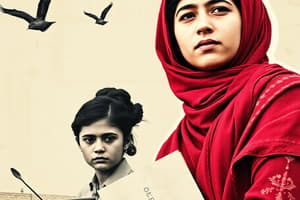Podcast
Questions and Answers
Malala expresses a complex ambivalence towards her media appearances. Which statement best encapsulates this internal conflict, considering the socio-political context of her activism?
Malala expresses a complex ambivalence towards her media appearances. Which statement best encapsulates this internal conflict, considering the socio-political context of her activism?
- She is primarily motivated by a desire for personal fame but is forced to suppress this desire due to cultural expectations of modesty.
- She recognizes the necessity of public advocacy for girls' education but feels personally detached and self-conscious when viewing her own televised image. (correct)
- She is indifferent to the cause of girls' education and participates in interviews only because of pressure from her parents.
- She enjoys the attention and recognition but dislikes the responsibility of representing girls' rights on a global scale.
When Malala reflects on her appearance, what deeper psychological phenomenon might this reveal about her state of mind during this tumultuous period?
When Malala reflects on her appearance, what deeper psychological phenomenon might this reveal about her state of mind during this tumultuous period?
- A calculated attempt to manipulate public perception by appearing vulnerable and relatable.
- An internalization of societal beauty standards, exacerbated by the stress and uncertainty surrounding her educational future. (correct)
- A genuine but superficial interest in fashion and personal grooming, unrelated to the broader political context.
- A growing sense of narcissism fueled by the media attention she is receiving.
Malala's defiant statement, "They cannot stop me. I will get my education," juxtaposed with her internal worries, indicates a complex interplay of what psychological defense mechanisms?
Malala's defiant statement, "They cannot stop me. I will get my education," juxtaposed with her internal worries, indicates a complex interplay of what psychological defense mechanisms?
- Rationalization and intellectualization, allowing her to detach emotionally from the severity of her situation.
- Idealization and projection, where she overestimates her own resilience and projects her fears onto external forces.
- Sublimation and reaction formation, channeling her anxiety into a public stance of unwavering determination while concealing her private doubts. (correct)
- Regression and denial, as she reverts to childlike fantasies of uninterrupted schooling.
Consider the symbolism of the school closing as a "funeral." What socio-political commentary is being subtly conveyed through this metaphor?
Consider the symbolism of the school closing as a "funeral." What socio-political commentary is being subtly conveyed through this metaphor?
Given the context of the Taliban's influence, what are the potential ramifications of Malala's words reaching "Taliban strongholds"?
Given the context of the Taliban's influence, what are the potential ramifications of Malala's words reaching "Taliban strongholds"?
How does the New York Times' decision to shift the documentary's focus to Malala, rather than solely her father, reflect a broader narrative strategy in international journalism?
How does the New York Times' decision to shift the documentary's focus to Malala, rather than solely her father, reflect a broader narrative strategy in international journalism?
What could be the underlying reason for Khushal's statement, "for once he wished he were a girl so he didn't have to go to school.", considering the specific social environment?
What could be the underlying reason for Khushal's statement, "for once he wished he were a girl so he didn't have to go to school.", considering the specific social environment?
In the context of the excerpt, how might the act of filming the last day of school be interpreted as both an act of resistance and a form of psychological trauma?
In the context of the excerpt, how might the act of filming the last day of school be interpreted as both an act of resistance and a form of psychological trauma?
Considering the cultural and political climate, what is the most plausible interpretation of Malala's father's "smiling uncomfortably with a mixture of pride and sadness"?
Considering the cultural and political climate, what is the most plausible interpretation of Malala's father's "smiling uncomfortably with a mixture of pride and sadness"?
What does Malala mean when she pictures, whilst looking at her father, "myself stuck at home, reading whatever books I could find until I ran out of books"?
What does Malala mean when she pictures, whilst looking at her father, "myself stuck at home, reading whatever books I could find until I ran out of books"?
Flashcards
Malala's Interviews
Malala's Interviews
Malala preferred to speak for girls' rights but avoided watching herself on TV.
Appearance Concerns
Appearance Concerns
Malala became self-conscious about her looks due to people's opinions.
Documentary Decision
Documentary Decision
The filmmakers chose to focus on Malala after she expressed hope for education.
Last Day of School
Last Day of School
Signup and view all the flashcards
Father's Support
Father's Support
Signup and view all the flashcards
Cameraman's Challenge
Cameraman's Challenge
Signup and view all the flashcards
Feelings of Despair
Feelings of Despair
Signup and view all the flashcards
Freedom of Education
Freedom of Education
Signup and view all the flashcards
Stubbornness and Hope
Stubbornness and Hope
Signup and view all the flashcards
Symbol of Resistance
Symbol of Resistance
Signup and view all the flashcards
Study Notes
Malala's Experience
- Malala reflects on a day when school was about to close.
- She was concerned about her future.
- A documentary crew arrived at her home during school hours.
- She was being documented at her home.
- Malala spoke to the documentary crew.
- Malala's father was hesitant about the documentary team's presence.
- They decided to follow Maleala's life.
- Malala was concerned about the possible implications of this documentary project.
- Malala was worried about the impact of the documentary on her future.
- Malala wanted to continue her schooling.
- Malala spoke about girls' rights.
Personal Reflection
- Malala describes feeling the pressure of expectations.
- Acknowledges she was similar to other people preoccupied with appearance.
- She questioned her looks.
- She noticed her looks differed from the others.
- She hated physical attributes of herself.
Family Involvement
- Malala mentions her father's meeting with journalists.
- The journalists asked her a question about her future.
- She responded that she would continue her education regardless of the risks involved.
- Her father supported her decision.
- The father was also worried about her future.
School Closure
- Malala's school was closing.
- A large portion of students did not attend school.
- The atmosphere was somber and melancholic.
- The future seemed uncertain.
- She felt it marked a moment of profound personal change.
Studying That Suits You
Use AI to generate personalized quizzes and flashcards to suit your learning preferences.




